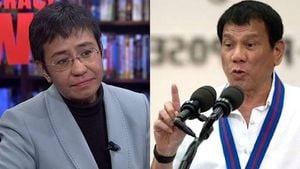On August 8, 2025, the White House, long considered the symbolic heart of American democracy, looked markedly different. U.S. President Donald Trump stood alongside Azerbaijan President Ilham Aliyev, but it wasn’t just the visiting dignitaries that caught the eye. According to The New York Times columnist Maureen Dowd, Trump’s "garish" rococo gold tastes have transformed the White House’s once tranquil scenery into something resembling a “Saudi palace”—a style she dubbed "dictator chic." Dowd didn’t mince words, calling Trump a "human wrecking ball" whose chaos has splattered far beyond mere décor, threatening the very fabric of American democracy.
Dowd’s criticism zeroed in on Trump’s recent overhaul of the Kennedy Rose Garden, which she described as a "Brutalist Rose Garden renovation"—a cold stone slab surrounded by Florida-esque patio furniture. She argued that these aesthetic changes are more than superficial. "Trump is trying to turn the people’s house into a Saudi palace—‘dictator chic,’” Dowd wrote. "It is symbolic of this president: He’s refashioning our democracy as an autocracy." For Dowd and other critics, these changes are emblematic of a deeper transformation: the reshaping of American institutions to serve Trump’s personal ambitions.
But the transformation hasn’t stopped at the White House’s physical appearance. Dowd accused Trump of making the Justice Department a "wholly owned subsidiary of Trump Inc.," alleging that he has turned the FBI into his personal, political police force. She pointed out that Trump’s Justice Department is now investigating prosecutor Letitia James and Senator Adam Schiff—both of whom have been vocal critics of the president. Another federal agency, she noted, is investigating former special counsel Jack Smith, who was responsible for overseeing two criminal cases against Trump.
Dowd also highlighted a particularly controversial move: Trump sent his former lawyer, now deputy attorney general, to interview convicted sex-trafficker Ghislaine Maxwell. Maxwell was subsequently transferred to a more lenient federal facility, fueling whispers of a possible pardon. The shake-ups didn’t end there. Brian Driscoll, who briefly served as acting head of the FBI, was dismissed for trying to protect agents involved in investigating the January 6 insurrection. In a move that stunned many observers, Trump appointed Jared Wise—a January 6 rioter who had egged on a mob to “kill” police officers—as an adviser to the Justice Department task force. This task force, Dowd reported, is "seeking vengeance against Trump’s perceived political foes."
Trump’s willingness to wield federal power for personal and political ends has extended beyond U.S. borders. Dowd noted that Trump slapped Brazil with a 50 percent tariff because the Brazilian government was prosecuting Jair Bolsonaro, the so-called "Trump of the tropics," for trying to overturn the election he lost in 2024. "The president’s unbridled gilt reflects his unbridled greed," Dowd concluded, emphasizing that Trump’s actions, both domestic and international, are reshaping the norms and expectations of American governance.
Political consultant David Axelrod, quoted by Dowd, offered a sobering reflection: "In one year, we’ll celebrate 250 years of independence from a mad king. Would you not give anything to invite Washington, Jefferson and Lincoln back to comment on what they’re seeing? It’s blasphemous." For many, the changes taking place under Trump’s leadership are not just a matter of taste or style but a profound challenge to the country’s democratic traditions.
If the White House’s transformation is a metaphor for Trump’s broader ambitions, his recent attacks on prominent Black Americans have made his intentions even more explicit. According to Salon.com, Trump’s rhetoric has grown increasingly direct and hostile, particularly toward Black public figures. On August 4, 2025, Trump accused former President Barack Obama of "treasonous" behavior, alleging without evidence that Obama launched an investigation into Russian interference in the 2016 election. Following a criminal referral from Trump’s Director of National Intelligence, Tulsi Gabbard, Attorney General Pam Bondi ordered federal prosecutors to open a grand jury investigation into these baseless accusations, despite the fact that multiple investigations—including those led by Republicans—have confirmed Russia’s meddling in the election to benefit Trump over Hillary Clinton.
Trump’s campaign of accusations hasn’t stopped with Obama. Last week, he targeted Beyoncé, Oprah Winfrey, Al Sharpton, and others, claiming they were part of a conspiracy to endorse his 2024 rival, former Vice President Kamala Harris, in an illegal manner. "IT’S NOT LEGAL! For these unpatriotic ‘entertainers,’ this was just a CORRUPT & UNLAWFUL way to capitalize on a broken system," Trump posted on Truth Social, promising a major investigation. Again, no evidence supports such a conspiracy.
On August 1, Trump lashed out at radio personality Charlamagne tha God, calling him a "low IQ individual" and a "racist sleazebag" after Charlamagne questioned the president’s policies. The next day, he criticized CBS journalist Gayle King, saying her career was over for not supporting him: "Gayle King’s career is over. She should have stayed with her belief in TRUMP. She never had the courage to do so. No talent, no ratings, no strength!!!"
Perhaps most inflammatory were Trump’s remarks on August 5 during a CNBC interview, where he stated that "inner city" people—widely understood as a coded reference to Black Americans—are lazy, while "illegal aliens" (meaning Hispanic and Latino immigrants) "have a natural talent for physical labor." Trump said, "[P]eople that live in the inner city are not doing that work. They’re just not doing that work, and they’ve tried, we’ve tried, everybody tried, they don’t do it…These people do it naturally, naturally." These comments, according to the National Museum of African American History and Culture, echo centuries-old white supremacist stereotypes devised during the trans-Atlantic Slave Trade to justify slavery.
Media critics, including Bill Kristol, Andrew Egger, and Jim Swift of The Bulwark, have noted that Trump’s explosive accusations and rhetoric have not received the sustained media scrutiny they warrant. "You might expect it to be big news. And yet it faded into the background almost at once. How far through the looking glass are we, that this sort of thing reads to so many as a ‘dog bites man’ story?" they observed, highlighting the normalization of such behavior in public discourse.
Experts say that the cumulative effect of Trump’s rhetoric and policies is not abstract. Psychologists describe the phenomenon as "racial battle fatigue," a form of collective post-traumatic stress disorder that disproportionately affects Black Americans. Chronic stress from navigating a society shaped by racial discrimination can lead to premature aging and significant health issues, as public health experts have demonstrated. Philosopher Cornel West has long argued that Black Americans exist in a state of being "unsafe, unprotected, subject to random violence, and hated for who they are."
Filmmaker Kevin Willmott, writing in The Nation, summed up the moment starkly: "The Confederacy has gobbled up the Union…The entire nation is capitulating to the new Confederate States of America." For many observers, the intersection of racism and authoritarianism under Trump’s leadership represents not just a political crisis but an existential threat to the nation’s democratic ideals and the well-being of its most vulnerable citizens.
As America nears its 250th anniversary, critics argue that the country faces a reckoning—not just with its past, but with the choices it makes today about the kind of nation it will be tomorrow.



